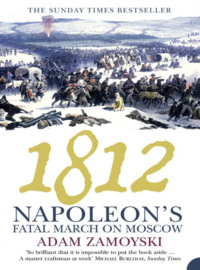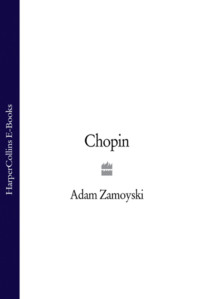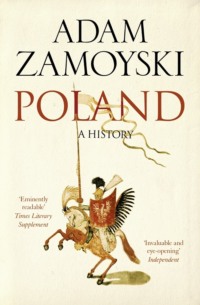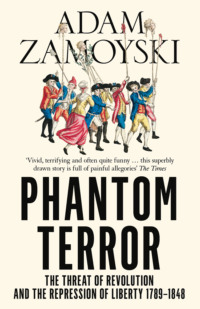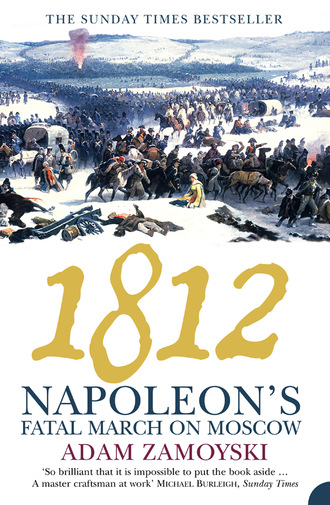
Полная версия
1812
France’s claim to the mantle of Imperial Rome seemed to gain validation when, in 1810, Napoleon married Marie-Louise, daughter of the last Holy Roman Emperor Francis II. His father-in-law, now Emperor of Austria under the name of Francis I, appeared to acquiesce in this transference of power. When Napoleon produced an heir, Francis ceded to the child the title of King of Rome, which had traditionally been that of the son of the Holy Roman Emperor.
France’s position on the Continent was by then one of unprecedented power; her political culture and the new system were imposed over vast areas of Europe. But to the average Frenchman this was of less interest than the benefits the past decade had brought him at home. All the most positive gains of the revolution had been salvaged, but order, prosperity and stability had been guaranteed, and a general amnesia if not amnesty had allowed those divided by the struggles of the revolution to put the more unpleasant aspects of the past behind them. Whether this new order would survive depended not only on Napoleon’s ability to defend it, but on his ability to guarantee its continuance by cancelling out the possibility of a Bourbon restoration. A return of the Bourbons would mean not only a return to the ancien régime; it would also raise the prospect of much score-settling.
In this respect, the birth of the King of Rome was crucial. Most of Napoleon’s subjects believed that their ruler, who had recently turned forty, would henceforth be inclined to spend more time with his family than with his armies, that Napoleon the Great would in time be succeeded by Napoleon II, and that the rest of Europe would accept that the Bourbons had been consigned to history. That was why they rejoiced. ‘People sincerely anticipated a period of profound peace; the idea of war and occupations of that sort were no longer entertained as being realistic,’ wrote Napoleon’s chief of police, General Savary, adding that the child appeared to all as the guarantor of political stability.10
Napoleon himself rejoiced for much the same reasons. ‘Now begins the finest epoch of my reign,’ he exclaimed. He had always been keenly aware that a man who seizes the throne can never rest easy on it, and that he could only achieve security of tenure by means of the dynastic principle. ‘With the birth of my son, there is a future in my destiny,’ he told one of his diplomatic agents. ‘I am now founding a legitimacy. Empires are created by the sword and are conserved by heredity.’11
But he was not yet ready to lay down his arms. He had managed to destroy the unity of purpose which had fed the coalitions against France for so long. Austria, Russia and Prussia were now as ready to fight each other as to fight France, the original repugnance to treat with ‘the Corsican upstart’ had largely evaporated, his imperial title was recognised across the Continent, and the Bourbon pretender Louis XVIII was beginning to look like an anachronism. Yet Napoleon was keenly aware of his continuing vulnerability, for nothing had been finally settled.
Over the past decade he had turned France into an empire which included the whole of Belgium, Holland and the North Sea coast up to Hamburg, the Rhineland, the whole of Switzerland, Piedmont, Liguria, Tuscany, the Papal States, Illyria and Catalonia, and ruled directly over some forty-five million people. The French Empire was surrounded by a number of dependent states – the Kingdom of Westphalia, the kingdoms of Saxony, Bavaria, Württemberg and other states grouped in the Confederation of the Rhine, the Grand Duchy of Warsaw, the kingdoms of Italy, Naples and Spain, ruled by Napoleon’s siblings, relatives or devoted allies. The only part of his vast imperium where there was open unrest was in Spain, where armed opposition to his brother King Joseph was being supported by a British army. This was not in itself a major problem, and could be dealt with by a concerted operation under his own direction.
The real problem facing Napoleon was how to achieve some kind of finality and to fit all his conquests into a system that would guarantee his and his successors’ position. While others regarded him as a megalomaniac bent on conquering all, he saw his wars as defensive, aimed at guaranteeing France’s security as well as his own. ‘To leave my throne to my heirs,’ he told one of his chamberlains, ‘I will have had to be master of all the capitals of Europe!’ In the written instructions to one of his diplomatic envoys, he explained that although France

was at the height of her power, ‘if she cannot fix the political constitution of Europe now, she may tomorrow lose all the advantages of her position and fail in her enterprises’.12
But a final settlement that would secure his gains for the future eluded him, partly because he kept expanding its scope, meaning it to be comprehensive, and partly because war was his element; he could not see his way to achieving his ends by other means. That was why all his treaties to date were no more than truces, and all his arrangements remained fluid pending the elusive ultimate peace settlement. The Empire was a work in progress.
At the time of the birth of his son, Napoleon was forty-two years old. He was five feet two inches tall, which was small even at the time, but he had a well-proportioned figure. ‘His complexion had never had much colour; his cheeks were of a matt white, giving him a full, pale face, but not of the kind of pallor that denotes a sick person,’ wrote his secretary Baron Fain. ‘His brown hair was cut short all over and lay flat over his head. His head was round, his forehead was large and high; his eyes were grey-blue, with a gentle look in them. He had a handsome nose, a graceful mouth and beautiful teeth.’ But he had recently begun to put on weight. His body filled out, his neck, which was short anyway, thickened, and he developed a paunch. Those close to him noted that his eyes grew less piercing. He spoke more slowly and took longer to make decisions. His phenomenal powers of concentration diminished, and those used to his fits of fury were surprised to find him growing more pensive and hesitant. Something was eating away at the vital force of this Promethean creature. It has been convincingly suggested that his pituitary gland failed as he reached the age of forty, causing dystrophia adiposogenitalis, a condition that leads to weight gain and loss of energy.13
It is impossible to say whether Napoleon himself was aware of any decline. His enemies had certainly noted that his victories were no longer as resounding as they had been, and he must have realised this as well. Even if this was not quite the twilight of his life, the end of his active career could not be that far off, so the final battles would have to be fought soon and a permanent settlement put in place in the near future.
The principal obstacle to such a settlement was Britain, with which France had become locked in a self-perpetuating duel. With her control of the seas, Britain could cripple French trade and support resistance anywhere on the European mainland, as she was currently doing in Spain. After the annihilation of his fleet at Trafalgar in 1805 Napoleon could not hope to confront the British navy in battle. He had therefore decided to ruin her economically, by closing the whole Continent to her trade.
The idea was not new. It was one of the fundamental French beliefs that Britain’s wealth came not from herself but from her colonies, which supplied commodities she could sell on to Europe at vast profit. Every conflict between Britain and France over the past century had included a tariff war, and the revolutionary government and the Directory inherited this tradition. As there was widespread commercial jealousy of Britain, this was a popular policy. Napoleon carried on this tradition, setting ever higher tariffs and eventually banning all British trade from the Continent.
In theory, the French policy was bound to bring about economic hardship in Britain that would undermine support for her war effort. The Whigs, currently in opposition, had sympathised with the revolution in France and opposed the waging of war against her, and many admired Napoleon himself. Although they were in a minority, their calls for peace with France might well have carried the day if British trade had really begun to suffer. But in the long run, France probably suffered more than Britain. And Napoleon’s Continental System, as he called it, was in effect unenforceable. Smuggling and corruption holed it even in French ports, while some of France’s dependent states and allies were hardly enforcing it at all.
Worse, it imposed real hardships on the populations of subject and allied states. Nowhere more so than in the very area France most needed to control. Germany was feeling the cost very keenly, and political discontent was mounting. Although most of the sovereigns who ruled there were strongly attached to the French cause, the mood of their people might make them think twice if an alternative became possible. Such a situation might arise if French power were challenged, but there were only two powers capable of mounting such a challenge – Britain, which could not gain a serious foothold on mainland Europe, and Russia, which was an ally of France.
But Russia was not a happy ally, and nobody realised better than Napoleon that if she were to break out and challenge his authority, Britain could never be brought to the negotiating table, and the whole of Germany would be destabilised. Russia was therefore the key, and she would have to be brought back on side before any final settlement could be achieved. What he could not appreciate was that it was already far too late for that, and that even as French society was looking forward to a golden age of peace, Russia was coming to see war with France as unavoidable, desirable even, while her ruler was entertaining dreams of his own for the regeneration of Europe.
2
Alexander
When Catherine the Great came to the throne, exactly half a century before 1812, Russia had been of little significance outside the immediate area of eastern Europe. Peter the Great had done much to modernise his kingdom, and he put it on the map by building a fancy new capital at St Petersburg. In 1721 he even awarded himself the title of Emperor. But he was succeeded by a series of largely ineffectual monarchs, most of them ushered in through disreputable palace revolutions. They were feared by their subjects but generally despised by the other rulers of Europe, none of whom recognised the imperial title Peter had assumed.
Catherine changed all that. She worked hard at organising the state, involved herself in the affairs of Europe, and initiated an aggressive foreign policy which over the next fifty years was to add the whole of Finland, what are now Estonia, Latvia, Lithuania, Belarus and Ukraine, most of Poland, the Crimea, some of what is now Romania, the Kuban, Georgia, Kabardia, Azerbaidjan, parts of Siberia, Chukchi and Kamchatka to her dominions, as well as part of Alaska and a military settlement just north of San Francisco. This not only increased the size and population of Russia, it also brought her frontiers six hundred kilometres further into Europe and her rulers into European affairs. By 1799 Russian armies were operating in Switzerland and Italy. In a memorandum to Catherine’s successor Paul I, the Russian Chancellor Fyodor Vasilievich Rostopchin wrote: ‘Russia, as much by her position as by her inexhaustible resources, is and must be the first power in the world.’1 It was a constant aim of Russian policy to extend that power over the Balkans, Ottoman Turkey and into the Mediterranean.

Many in Europe were alarmed at this seemingly inexorable onward march of Russian power. There was talk of ravening Asiatic hordes and some fear, particularly after the first partition of Poland in 1772, that Russia might engulf the whole of Europe as the barbarians had done with ancient Rome. ‘Poland was but a breakfast … where will they dine?’ Edmund Burke wondered, echoing the fears of many.2 Diplomats were struck by the single-mindedness and ruthlessness of Russia’s foreign policy: she did not play by the same rules as others. What few appreciated was the extent to which Russia saw herself as a special case.
When Ivan IV, popularly known as the Terrible, was crowned in the Uspensky cathedral in the Kremlin in 1547, he took the title of Tsar (Caesar) and laid claim to the legacy of Byzantium. ‘Ivan was claiming not only sovereignty, independence from other powers,’ in the words of Geoffrey Hosking, ‘but the actual superiority of his realm, as the universal Christian monarchy, to all others on earth.’3 He used the regalia of Byzantium and had himself depicted alongside Roman emperors. His successors and their political servants remained faithful to this legacy and the mission it imposed. It was not for nothing that Catherine had named her two eldest grandsons Alexander and Constantine.
France had traditionally kept a string of allies in the east – Sweden, Poland and Ottoman Turkey – whose purpose it was to contain the then dominant threat of Habsburg power in central Europe. When Russia began to impinge, she depended on this ‘barrière de l’est’ to guard against the new threat developing in the east. But by the end of the eighteenth century, Sweden had declined as a power, Poland had ceased to exist, and Turkey had been pushed out of the Crimea and Moldavia, and was in a state of political decay. France would have to look elsewhere for allies.
In 1801 General Bonaparte, who was then First Consul, decided to make an ally of Russia herself. When, during negotiations on the exchange of prisoners, the British and Austrians refused to accept seven thousand of their Russian allies taken prisoner by the French in Switzerland in exchange for French prisoners they were holding, Bonaparte offered them free to Tsar Paul. He even volunteered to clothe and arm them. Paul, who had previously held everything to do with revolutionary France in abhorrence, was as disarmed by this chivalrous gesture as he was annoyed by the mean-mindedness of his Austrian and British allies. Bonaparte, who knew how much the Russians lusted for a harbour in the Mediterranean, followed this up by offering Paul the island of Malta (which was about to be captured by the British anyway). He would at this stage even have contemplated awarding Constantinople to Russia in order to enlist her support against Britain. He was well on the way to achieving this when, on the night of 23–24 March a group of generals and court officials forced their way into Paul’s bedroom in the Mikhailovsky Palace in St Petersburg and murdered him.4
Paul had been mentally and emotionally unstable, if not actually mad, and there was an open sense of relief in Russia at his death. Whenever his son and successor Alexander showed himself in public in the first weeks of his reign, he was mobbed by people kissing his hands and clothes, and Pushkin later wrote of ‘the magnificent dawn of Alexander’s days’. But while he stands out among the monarchs of his day by his generous nature, his lack of vindictiveness and his hatred of injustice and cruelty, Alexander was also marked by severe psychological problems.
Though not unintelligent, he suffered from an inability to think through the consequences of his words and actions. This need not have mattered much had it not been for the education his grandmother, Catherine the Great, had devised for him. She was a despot who admitted no liberal ideas in or near her dominions. Yet alongside mathematicians and priests, she engaged the services of the Swiss republican philosophe Frédéric César de La Harpe as tutor for her grandson. The child was subjected to a regime of moral education which consisted of the study of improving stories drawn from the scriptures, history and mythology, as well as a whole canon of secular Enlightenment morality. His limited mind could hardly have been expected to square the religious precepts with the profane, or to accommodate within the despotic reality the radical concepts preached by La Harpe. ‘This little boy is a knot of contradictions,’ Catherine commented, somewhat disingenuously, after a few years of this diet.5
Alexander’s principal failings – vanity, weakness and laziness – also need not have mattered much, had it not been for the brand of moral education to which he was subjected, and which expanded his perceived duties well beyond his capacities. He had to keep notebooks, ‘archives of shame’, in which he jotted down every failing, every piece of bad behaviour, every loss of temper or lack of diligence in study. ‘I am an idler, given over to irresponsibility, incapable of true thought, speech and action,’ the twelve-year-old notes on 19 July 1789. ‘Egoism is one of my shortcomings, and vanity its main cause; it is easy to see to what they might lead me if I give them a chance to develop,’ on 27 August.6 This continuous self-flagellation only aggravated an innate sense of inadequacy.
When he came to the throne at the age of twenty-three, Alexander was a young man of great charm, burning with desire to improve the world. But as he struggled to live up to what he thought was expected of him, he was undermined by a terrible moral canker. His father’s murderers had naturally made him a party to their plans, since it was in order to put him on the throne that they had decided to act. He would claim that he made them swear they would not kill Paul, but he was nevertheless an accomplice in the crime of parricide. He could hardly penalise them, so they continued to hold high office at court and rank in the army. Alexander was racked with guilt for the rest of his life for the part, however passive, he had played in the murder.
He was indeed a mass of contradictions. He claimed to despise the principles of hereditary monarchy, and recoiled before the necessity of assuming power. ‘My plan is to settle with my wife on the banks of the Rhine, where I shall live peacefully as a private person finding happiness in the company of friends and in the study of nature,’ he confided to one of his friends at the age of nineteen. But he soon fell out of love with his wife and with the notion of a tranquil, private life. He also used to hold forth on the liberal constitutions he was going to introduce. But once he had gained power, he grew jealous of letting anyone else have any say in how things should be done, and notoriously took offence whenever privileges and rights he had granted were actually invoked.7
Alexander wanted to bring an element of professionalism into the governance of the Russian empire through the introduction of institutional structures. He reorganised the civil service, making entrance into the higher grades dependent on a university degree or a written exam (which did not endear him to the nobility). He set up ministries and a State Council, which were supposed to help run the country. What he would have liked to introduce was something along the lines of the system Bonaparte was creating in France – authoritarian government mobilising the whole nation in an efficient way along rational and liberal lines. But this would have required emancipating the serfs and breaking down the entire social structure of Russia, and he lacked the nerve to implement it.
Absorbed as he was by internal reforms, Alexander paid little attention to foreign policy. He was horrified by Bonaparte’s abduction and judicial murder of the Duc d’Enghien, and joined every other ruler in Europe in robust condemnation of the act. It offended every fibre in his chivalrous nature, and he felt the outrage personally: the Duke of Baden, on whose territory Enghien had been seized, was his father-in-law. He therefore couched his condemnation in grandiloquent terms. But he was made to regret it. The French response was to remind the world that Paul’s assassins had not only never been punished, but actually held high office at his son’s court, thereby putting in question Alexander’s right to point the finger at anyone, in view of the part he had played in the murder of his own father. Alexander was stung, and hated Bonaparte for it. When Bonaparte took the title of Emperor a few months later, Alexander’s hatred turned to indignant rage, and the bearer of Peter the Great’s invented title denounced that taken by the upstart Corsican.
Alexander believed that Europe had reached a crisis, moral as well as political, and wrote to the British Prime Minister William Pitt suggesting a reorganisation of the Continent into a league of liberal states founded on the sacred rights of humanity. Pitt was not interested in the scheme, but he pandered to Alexander, and, allowing him to dream of greater things, in 1805 managed to enrol him into the third coalition against Napoleon: Austria and Russia were to attack France, and Britain would pay for it.
Russia had no reason for going to war with France, as none of her interests were threatened, and France was Russia’s cultural beacon. Russian society was divided on the matter. While those who regarded Napoleon as an evil being who had to be crushed were probably in the majority, there were plenty who thought otherwise. The former Chancellor Count Rostopchin was vociferous in his criticism, propounding the view that Russia was being used by Britain; his future successor, Count Nikolai Rumiantsev, regarded France as Russia’s natural ally. Napoleon had many admirers in Russia, particularly among the young – some of whom would be drinking his health even after the war had begun.8
But Alexander had come to see the whole question as part of a wider moral issue. He had assumed the role of knightly defender of a Christian monarchical tradition against the onslaught of the new barbarism as represented by Napoleon. An element of emulation also came into it, for he longed to distinguish himself on the battlefield. He had inherited his father’s love of parades and the minutiae of military life – he was always checking details of uniforms and drill – and believed that a Tsar’s place was at the head of his troops. He therefore insisted on setting off to war in person, although he gave overall command of his armies to the only experienced general to hand, the fifty-eight-year-old Mikhail Ilarionovich Kutuzov.
Kutuzov had first seen action against Polish insurgents, and subsequently distinguished himself in several campaigns against Turkey. In 1773 in the Crimea he had received a bullet in the head which severed the muscles behind his right eye, causing it to sag in a grotesque way; eventually he lost sight in it. Kutuzov had been military governor of St Petersburg at the time of the murder of Tsar Paul, so he knew a thing or two about that. This was not the least of the reasons for which Alexander feared and resented him, and as a result he dismissed him and exiled him to his country estate. There, Kutuzov relieved his boredom and his rheumatic pains with drink and whatever sexual solace the rural retreat could provide his notorious appetite. And it was there, in the summer of 1805, that he suddenly received the order to take command of the army and join forces with the Austrians.
The army was not ready, so Kutuzov set off with an advance guard to reinforce the Austrian General Mack. Napoleon acted with speed and surrounded Mack, forcing him to surrender at Ulm while Kutuzov was still on the march. Massively outnumbered, Kutuzov was obliged to fall back and join up with the Russian main army, led by Alexander, and the remainder of the Austrian forces under the Emperor Francis.
Napoleon had never seen any good reason for France and Russia to fight, and was convinced that Alexander had been manipulated by Britain into joining the coalition. He therefore sent General Savary to the Tsar with the suggestion that they get together and sort out any differences amicably. But Alexander haughtily declined, famously addressing his reply to ‘the Head of the French Government’, as he could not stomach acknowledging Napoleon’s imperial title.
Kutuzov wanted to retreat further, but Alexander was determined to fight, and obliged him to give battle at Austerlitz on 2 December. Like a subaltern playing at being commander, Alexander overruled Kutuzov’s suggestions and made him adopt a plan devised by one of the Austrian generals. On the day, he bossed and chivvied Kutuzov for the slowness of his deployment, and then watched in horror as the allied army was routed. Forced to flee from the battlefield, Alexander was mortified. ‘He was himself even more thoroughly defeated at Austerlitz than his army,’ according to the French diplomat Joseph de Maistre.9 The Tsar now resented Kutuzov all the more, and dismissed him from his command, giving him the minor post of Governor of Kiev.


